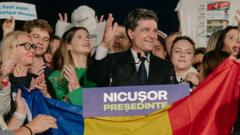In a significant turn of events in Romanian politics, liberal and pro-EU mayor Nicusor Dan has secured the presidency, defeating nationalist candidate George Simion in a closely contested election marked by political upheaval and controversy.
Liberal Nicusor Dan Triumphs Over Nationalist George Simion in Romanian Presidential Election

Liberal Nicusor Dan Triumphs Over Nationalist George Simion in Romanian Presidential Election
Nicusor Dan's victory highlights the Romanian electorate's desire for a pro-European agenda amidst political tensions and uncertainty.
Nicusor Dan, who has been serving as the mayor of Bucharest, emerged victorious with 54% of the votes against Simion, the leader of the far-right AUR party. This election followed a tumultuous period where allegations of Russian interference led to the annulment of a previous presidential race, a situation that fueled Simion's initial strong showing in the first round of elections where he capitalized on public frustration.
Once the results came in, Dan emphasized the importance of uniting the nation, stating, "We need to build Romania together irrespective of who you voted for." With over 11.6 million Romanians participating in the run-off, more than six million supported Dan, who celebrated his victory at a jubilant gathering with supporters in Bucharest.
The election outcome reflects a broader discontent among Romanians with traditional political parties, especially after the recent collapse of the government and the failed candidacy of the former president. Dan's platform focused on anti-corruption measures and steadfast support for neighboring Ukraine, starkly contrasting with Simion's nationalistic rhetoric and calls to reduce aid to Ukraine.
As Dan's supporters cheered, they highlighted his vision for a "better future" for the country and for their families. Despite exit polls indicating a potential win for Dan, Simion initially clung to hope, especially given strong support among the diaspora in Europe. However, he eventually acknowledged Dan's victory on social media after a night of uncertainty.
While Simion's base, particularly among Romanians abroad, highlighted a growing nationalist sentiment, Dan's supporters rallied in greater numbers, securing his leadership. The election results are viewed as a resounding rejection of an isolationist approach and a reaffirmation of Romania's commitment to the European Union and its democratic values.
International reactions poured in, with congratulations from leaders in Moldova and Ukraine, who underscored the importance of cooperative relations moving forward. The European Commission also recognized the significant voter turnout as an endorsement of a transparent and progressive Romania within a strong European framework.
Ultimately, this election signals a critical moment in Romanian politics, affirming the desire for a pro-European stance while addressing the challenges posed by rising nationalism. Yet, Simion's performance indicates that the national conversation around identity and change is far from over, as significant portions of the electorate remain supportive of his vision.
Once the results came in, Dan emphasized the importance of uniting the nation, stating, "We need to build Romania together irrespective of who you voted for." With over 11.6 million Romanians participating in the run-off, more than six million supported Dan, who celebrated his victory at a jubilant gathering with supporters in Bucharest.
The election outcome reflects a broader discontent among Romanians with traditional political parties, especially after the recent collapse of the government and the failed candidacy of the former president. Dan's platform focused on anti-corruption measures and steadfast support for neighboring Ukraine, starkly contrasting with Simion's nationalistic rhetoric and calls to reduce aid to Ukraine.
As Dan's supporters cheered, they highlighted his vision for a "better future" for the country and for their families. Despite exit polls indicating a potential win for Dan, Simion initially clung to hope, especially given strong support among the diaspora in Europe. However, he eventually acknowledged Dan's victory on social media after a night of uncertainty.
While Simion's base, particularly among Romanians abroad, highlighted a growing nationalist sentiment, Dan's supporters rallied in greater numbers, securing his leadership. The election results are viewed as a resounding rejection of an isolationist approach and a reaffirmation of Romania's commitment to the European Union and its democratic values.
International reactions poured in, with congratulations from leaders in Moldova and Ukraine, who underscored the importance of cooperative relations moving forward. The European Commission also recognized the significant voter turnout as an endorsement of a transparent and progressive Romania within a strong European framework.
Ultimately, this election signals a critical moment in Romanian politics, affirming the desire for a pro-European stance while addressing the challenges posed by rising nationalism. Yet, Simion's performance indicates that the national conversation around identity and change is far from over, as significant portions of the electorate remain supportive of his vision.



















